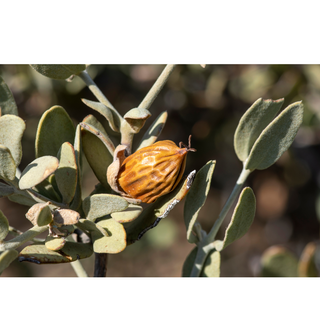Just about every Fatskn recipe holds a bit of unrefined, cold-pressed jojoba oil– and for good reason.
Nicknamed “desert gold,” by tribes native to the American Southwest, jojoba oil remains a treasured skincare ingredient today thanks to its unique structure and medicinal properties.
It’s a nutrient-rich fat made up of mostly wax esters that closely resemble natural sebum. This allows it to sink deep into the skin, balance moisture stores, defend against damage, and promote healing on a cellular level.
Keep reading to learn more about why we revere this skin-like wax and how it partners with tallow to nourish your skin.
Where does jojoba come from? How is it harvested?
Before we get into the nitty-gritty skin science, let’s look at jojoba’s origin story.
Jojoba (pronounced ho-HO-ba) is a seed extract from the desert-loving shrub of the same name. Though in its natural form, jojoba is loaded with health-promoting vitamins and minerals, the way it’s extracted can significantly alter its nutrient profile. The two most common methods are hexane extraction and cold-pressing.
Hexane is a petroleum-derived solvent that dissolves the oil from the seeds. While this process yields more oil, it strips away nutrients and deposits chemical residues in the final product. No thanks.
Cold-pressing is a much gentler way to usher out this golden oil because pressing the seeds at lower temperatures preserves all the beneficial compounds that make jojoba so special. Our supplier takes pride in doing things right, so every drop of jojoba in Fatskn products is 100% organic and, of course, cold-pressed.
Jojoba and sebum– the science.
Did you know sebum is actually pretty waxy? And that’s a good thing! It naturally coats the outer surface of our skin, forming a protective barrier that locks in hydration– our built-in moisturizer.
Triglycerides, fatty acids, and wax esters make up the bulk of sebum in healthy skin, with only a small amount of unstable squalene (not to be confused with olive squalane).
Though it has gained a bad reputation when it comes to things like acne, sebum does not inherently cause breakouts. It’s only when the ratio of these lipids is off. Acne-prone skin is more likely to contain less stable fatty acids and more unsaturated fats like squalene. Though this fat is a naturally occurring antioxidant, it's highly unstable in the skin and tends to overreact in large amounts. (1)
Wax esters, on the other hand, are essential for keeping our skin healthy because they’re made up of long carbon chains with more distance between their double bonds, making them less likely to break. These more saturated fats (technically monounsaturated) won’t go rancid in the skin and oxidize.
Most plant oils have double bonds that are closer together and attract more free radicals– the real trigger for wrinkles and breakouts. Jojoba is unique because it's made up almost entirely of the same long-chain fatty acids (wax esters) in our sebum, making it incredibly resistant to oxidation (and perfect for your skin).
Jojoba and your skin–the benefits.
Jojoba oil is the ultimate skin-balancing ingredient thanks to its resemblance to our own natural waxy oils and its impressive lineup of nutrients.
Here are all the ways it nourishes your skin:
Restores moisture levels: Where our skin is lacking moisture or overproducing sebum, jojoba oil can fill in the gaps and bring things back into balance. This is because our skin recognizes the wax esters and adjusts its sebum output accordingly.
Won’t clog pores: Non-greasy and non-comedogenic, jojoba is ideal for moisturizing acne-prone skin because it's lighter and more stable than other plant oils. It promotes the cell regeneration needed to heal current blemishes while fading the scars left behind by past breakouts.
Soothes irritation + inflammation: The nourishing and anti-inflammatory properties in jojoba oil help calm irritated skin that often accompanies conditions like eczema and psoriasis, where wax esters and fatty acids are often lacking.
Protects against damage: Rich in antioxidants like vitamin E and other phenolic compounds, jojoba offers potent protection against environmental stressors, neutralizes free radicals, and prevents oxidative damage. Just another reason this oil is known for its resilience and stability.
Rebuilds a compromised skin barrier: Much like tallow, jojoba is rich in vitamins and minerals like vitamins A, B, D, E, copper, and zinc that nurture and rebuild the skin barrier for a healthy, vibrant complexion.
Slows skin cell aging: Not only does jojoba defend cells against free radicals, but it also helps diminish the appearance of fine lines and wrinkles by stimulating collagen production in the skin for more elasticity and firmness.
Jojoba and tallow– the magic.
Unlike jojoba, pretty much all other oils are made up of triglycerides (fat molecules) with three fatty acids and one glycerol molecule. But as you know, not all fats are created equal.
The weak chains that make up polyunsaturated fats like soybean or sesame oil have several double bonds that make them notoriously unstable when exposed to heat and air (lots of both in our skin, btw). Using skincare products with these types of fats opens the door to more free radical damage and irritation.
Thankfully, most of the triglycerides in our beloved grassfed tallow don’t contain any double bonds, making it one of the most stable fats you can put on your skin. So as you weave these kinds of lipids into the fabric of your tissues, the more “saturated” and resilient your cells will become.
It’s why we opt for only the most stable, saturated, skin-like fats in every Fatskn product, like grassfed tallow and cold-pressed jojoba. Together they deeply penetrate the skin, rebalance oil production, moisturize skin cells, fend off oxidative stress, and reinforce the beautiful tapestry that is your skin.
As always, while we hope to be a no-nonsense resource for you, we encourage you to do your own research to find the healthiest options for you and your family. Don’t forget to check out our entire collection of tallow-based skin care products by clicking the link below. We hope to see you there!
REFERENCES:
- Pappas, A., Johnsen, S., Liu, J. C., & Eisinger, M. (2009). Sebum analysis of individuals with and without acne. Dermato-endocrinology, 1(3), 157–161. https://doi.org/10.4161/derm.1.3.8473
- Gad, H. A., Roberts, A., Hamzi, S. H., Gad, H. A., Touiss, I., Altyar, A. E., Kensara, O. A., & Ashour, M. L. (2021). Jojoba Oil: An Updated Comprehensive Review on Chemistry, Pharmaceutical Uses, and Toxicity. Polymers, 13(11), 1711. https://doi.org/10.3390/polym13111711
- Pavel, P., Blunder, S., Moosbrugger-Martinz, V., Elias, P. M., & Dubrac, S. (2022). Atopic Dermatitis: The Fate of the Fat. International journal of molecular sciences, 23(4), 2121. https://doi.org/10.3390/ijms23042121

